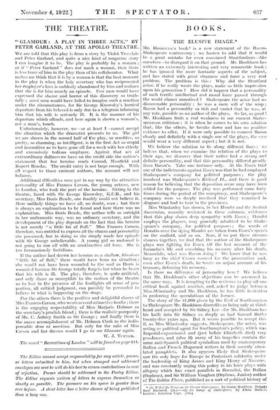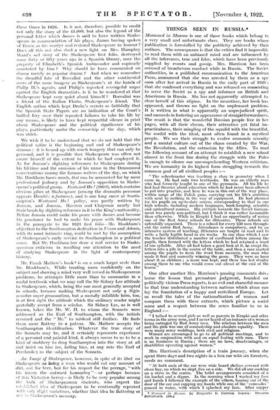BOOKS.
THE ELUSIVE IMAGE.* Mu. HooEnan's book I is a new statement of the Bacon- Shakespeare controversy ; we hasten to add that it would be a great mistake for even convinced Stratfordians—like ourselves—to disregard it on that ground. Mr. Hookham has written an extremely interesting and very reasonable book ; he has ignored the more fantastic aspects of the subject, and has stated with great clearness and force a very real problem. The problem is this : Why did the Stratford actor, if he really wrote the plays, make so little impression upon his generation ? How did it happen that a personality of such terrific intellectual and moral force passed through the world almost unnoticed ? Shakespeare the actor had no discoverable personality ; he was a mere will o' the wisp ; Bacon had a personality so rich and varied that he was, at any rate, possible as an author of the plays. So far, so good ! Mr. Hookham finds a real weakness in our current Shake- spearean criticism ; it is when he comes to his own solution that, like the others, he breaks down and has no positive evidence to offer. If it were only possible to connect Bacon clearly and definitely with a single one of the plays, the case would wear a very different aspect ; but it is not.
We believe the solution to lie along different lines ; we believe that, when we examine the relation of the plays to their age, we discover that their writer had a strong and definite personality, and that this personality differed greatly from Bacon's. Take one instance only. At the Essex trial one of the indictments against Essex was that he had employed Shakespeare's company for political purposes ; the play involved was Shakespeare's Richard II., and there is good reason for believing that the deposition scene may have been added for the purpose. The play was performed some forty times during the period of the conspiracy, and Shakespeare's company were so deeply involved that they remained in disgrace and had to tour in the provinces.
Miss Winstanley has shown, in her Hamlet and the Scottish Succession, recently reviewed in these columns, evidences that this play shows deep sympathy with Essex ; Hamlet employs the players, very generally admitted to . be Shake- speare's company, for political purposes ; the words of Horatio over the dying Hamlet arc taken from Essex's speech on the scaffold, and so on. Now, if we put these circum- stances together, we find that the author of the Shakespeare plays was fighting for Essex till the last moment of the favourite's life and ennobling his memory after his death. Meanwhile, what was Bacon doing ? We know that he was busy as the chief Crown counsel for the prosecution and, even after Essex's death, he -wrote an unjust account of his treasons, defaming his memory.
Is there no difference of personality here ? We believe that Mr. Hookham's other objections can be answered in the same way. It is tempting to the reviewer to play off one critical book against another, and, asked to judge between Miss .Winstanley and Mr. Hookham, he has little hesitation in preferring the speculations of the former.
The story of the £1,000 given by the Earl of Southampton to Shakespeare Mr. Hookham discredits as being only at third- hand and accepted by Sir Sidney Lee—for Mr. Hookham has his knife into Sir Sidney as deeply as had Samuel Butler twenty-five years ago. But it seems possible to accept this if, as Miss Winstanley suggests, Shakespeare, the actor, was acting as political agent for Southampton's policy, which was Imperial-expansionist and (just before Elizabeth died) very pro-James, and (also if many of his tragedies contain the same anti-Spanish political symbolism used by contemporary Italian and French Huguenot writers in their secretly circu- lated pamphlets. It also appears likely that Shakespeare saw the only hope for Europe in Protestant solidarity under the leadership of King James and King Henry of Navarre, and was constantly urging this policy in his later plays with allegory which has exact parallels in Boccalini, the Italian (Orpheus), and Sir William Vaughan (Orpheus, Junior) author of The Golden Fleece, published as a sort of political history of
• (1) TV o' the Wisp; or, the Elusire Shakespeare. By George Hookham. Oxford: Basil Blackwell. (33.)—(2) An Image of Chokeepeare. By Frank Mathew. London ; Jonathan Cape. 11.8a.1
these times in 1626. Is it not, therefore, possible to credit not only the story of the £1,000, but also the legend of the personal letter which James is said to have written Shake- speare in commendation of his plays, James having spoken of Essex as his martyr and restored Shakespeare to honour ? Does all this not also shed a new light on Mrs. Humphry Ward's sad story of the Shakespeare first folio, destroyed sonic forty or fifty years ago in a Spanish library, once the property of Elizabeth's Spanish Ambassador and copiously annotated by him ? Why should he have commented on drama merely as popular drama ? And when we remember the dreadful fate of Bocealini and the other continental users of the same imagery as Shakespeare's at the hands of Philip II.'s agents, and Philip's reported revengeful anger against the English dramatists, is it to be wondered at that Shakespeare kept very quiet about himself ? Bocealini was a friend of the Italian Florio, Shakespeare's friend. The English nation which kept Drake's secrets so faithfully that the Spanish State Papers are an indication of the Court's baffled fury over their repeated failures to take his life by any means, is likely to have kept respectful silence in print about Shakespeare and the political significance of his plays, particularly under the censorship of the day, which was strict.
We wish it to be understood that we do not hold that the political satire is the beginning and end of Shakespeare's dramas ; it is bound up with much imagery that can only be personal, and it is possible that Shakespeare was often not aware himself of the extent to which he had employed it. As for Jonson's slighting references to Shakespeare during his lifetime and the omission of his name in the Drummond conversations among the famous writers of the day, on which Mr. Hookham bases much, that can be accounted for by mere professional jealousy and by Jonson's opposition to Shake- speare's political group. Eastward Ho ! (1604), which contains obvious gibes at Shakespeare (among the dramatis personae appears Hamlet : a footman), and is one long sneer at South- ampton's Westward //o ! policy, was partly written by Jonson, and Jonson, Marston and Chapman nearly lost their heads by slighting reference in it to the King's nationality. Before Jonson could make his peace with James and become his pensioner he had to make his peace with Shakespeare in the panegyric to the 1623 first folio—Mr. Hookham's objection to the Southampton dedication in Venus and Adonis, with its most intimate ring, could be met by the assumption of Shakespeare's early service to Southampton in a political sense. But Mr. Ilookham has done a real service to Shake- spearean criticism in recalling our attention to the need of studying Shakespeare in the light of contemporary history.
Mr. Frank Matthew's book= is on a much larger scale than Mr. Hookham's. While treating more confidently on the subject and showing a mind very well versed in Shakespearean problems, he attempts little more than to summarize in a useful textbook what we may call the Sir Sidney Lee attitude to Shakespeare, which, being the one most generally accepted in schools, because making Shakespeare not only a Sigis- mundus super grammaticos, but a morally infallible hero, too, is at first sight the attitude which the ordinary reader might gratefully accept from a scholar. Sir Sidney Lee, as is well known, takes the Mr. W. II. to whom the Sonnets were addressed as the Earl of Southampton, with the initials reversed and the " Mr." to mislead still further. He finds them mere flattery to a patron. Mr. Matthew accepts the Southampton identification. Whatever the true story of the Sonnets may be, and it certainly represents experience of a personal and painful kind, it always seems to us to be a kind of snobbery to drag Southampton into the story at all and insist on him (or, failing him, at any rate the Earl of Pembroke) as the subject of the Sonnets.
An Image of Shakespeare, however, in spite of its libel on Shakespeare as being a man who would cat any amount of dirt, not for love, but for his respect for the peerage, "with his intern the outward honouring "--or perhaps because of this Victorian hereSy--is likely to be very popular among the hulk of Shakespearean students, who expect the established idea of Shakespeare to be continually repeated with only slight variations, whether that idea be flattering or nut to Shakespeare's memory.







































 Previous page
Previous page